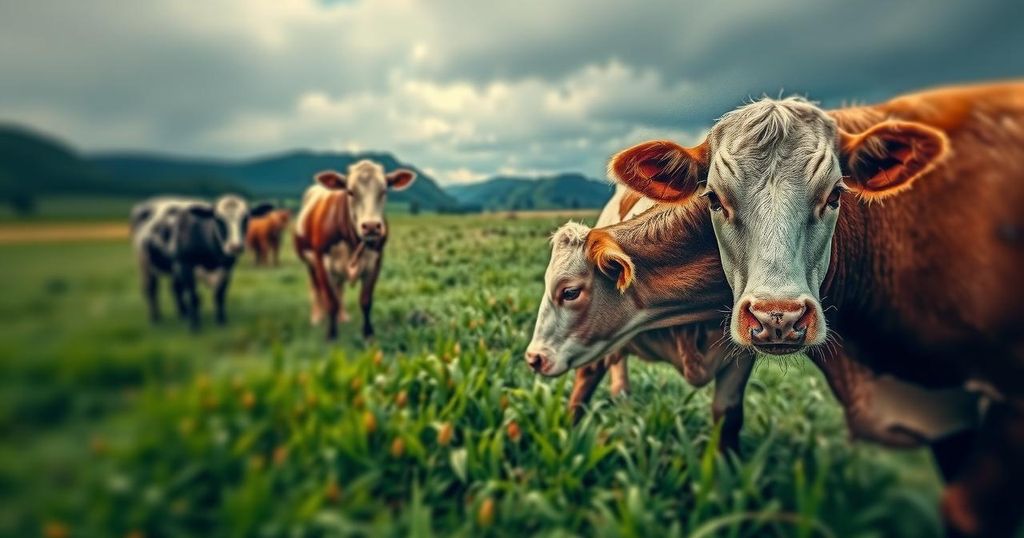Recognizing Livestock as Vital Contributors to Climate Action

The article discusses the importance of livestock in African livelihoods and food security, arguing that they can contribute positively to climate action when managed sustainably. It highlights the need to shift the narrative from negative perceptions about livestock’s environmental impact to recognizing their potential in biodiversity conservation, climate change mitigation, and land restoration. The call is for increased funding for sustainable livestock systems to better support vulnerable communities and ecosystems.
Climate policies must acknowledge the significant role of livestock in both the African food system and rural livelihoods, particularly in light of the misconceptions surrounding their environmental impact. Livestock, numbering around 400 million cattle in Africa alone, comprise a substantial portion of agricultural GDP, contributing 30 to 40 percent across the continent. They provide essential nutrition through small quantities of meat, milk, and eggs, which can lead to improved health outcomes, and offer reliable income sources, especially in regions where alternatives are scarce. Despite the focus on the environmental drawbacks of livestock farming, including habitat loss and greenhouse gas emissions, such perspectives fail to appreciate the potential benefits when livestock are grazed sustainably. As conversations advance in forums like the United Nations Climate Change Conference and the Convention on Biological Diversity, it is critical to transform the narrative surrounding livestock from one of liability to one of opportunity. Livestock, when managed diligently, can serve as effective agents of biodiversity conservation. Practices such as rotational grazing not only mimic natural ecological patterns seen in wild herbivores but also assist in preventing overgrazing and maintaining healthy grasslands while supporting both livestock and wildlife populations. The Maasai and Samburu communities in Kenya exemplify this synergy, where livestock farming is harmonized with ecosystem conservation, producing a significant portion of the nation’s milk and supporting biodiversity. Moreover, the climate discourse often reduces livestock contributions solely to methane emissions; however, cattle and other ruminants can play broader roles in climate change mitigation through improved rangeland management and climate-smart feeding practices. Integrating resilient forages into pasture systems leads to enhanced productivity and lower emissions. Additionally, sustainable grazing practices can facilitate carbon sequestration in rangelands, transforming these often-underappreciated landscapes into significant carbon sinks. Properly managed, rangelands have the potential to mitigate as much as 20.92 gigatons of carbon emissions by 2050, highlighting the importance of investments in sustainable livestock practices. In the face of climate variability, livestock provide crucial adaptive capacity for communities in arid and semi-arid lands. Pastoralists can strategically move their herds to optimize scarce resources, while indigenous breeds like the East African Zebu are particularly well-suited to thrive under such challenging conditions. Furthermore, sustainable livestock management plays an invaluable role in reversing land degradation, promoting soil health, and enhancing overall ecosystem resilience through measures like rotational grazing and controlled stocking. As global challenges around food security and land health intensify, the underfunding of the livestock sector becomes increasingly critical. International funding mechanisms must prioritize sustainable livestock systems, recognizing their essential role in addressing multifaceted environmental challenges while supporting vital food, livelihoods, and economic growth.
The livestock sector is integral to African economies and food security, yet it faces significant scrutiny for its perceived environmental impact. With livestock being a primary livelihood source for millions, the challenge lies in reframing the discourse to emphasize sustainable practices that offer both economic benefits and environmental stewardship. The article highlights how properly managed livestock systems can contribute positively to biodiversity, climate change mitigation, and land restoration, advocating for investment in sustainable practices.
In conclusion, livestock should not be dismissed as detrimental to climate action; rather, they should be recognized as crucial components of the solution. Sustainable livestock management practices have the potential to address many environmental challenges while supporting rural livelihoods. As forums convene to discuss climate policies, it is imperative to incorporate a perspective that sees livestock as assets for biodiversity and resilience, deserving of the necessary financial support.
Original Source: www.aljazeera.com






